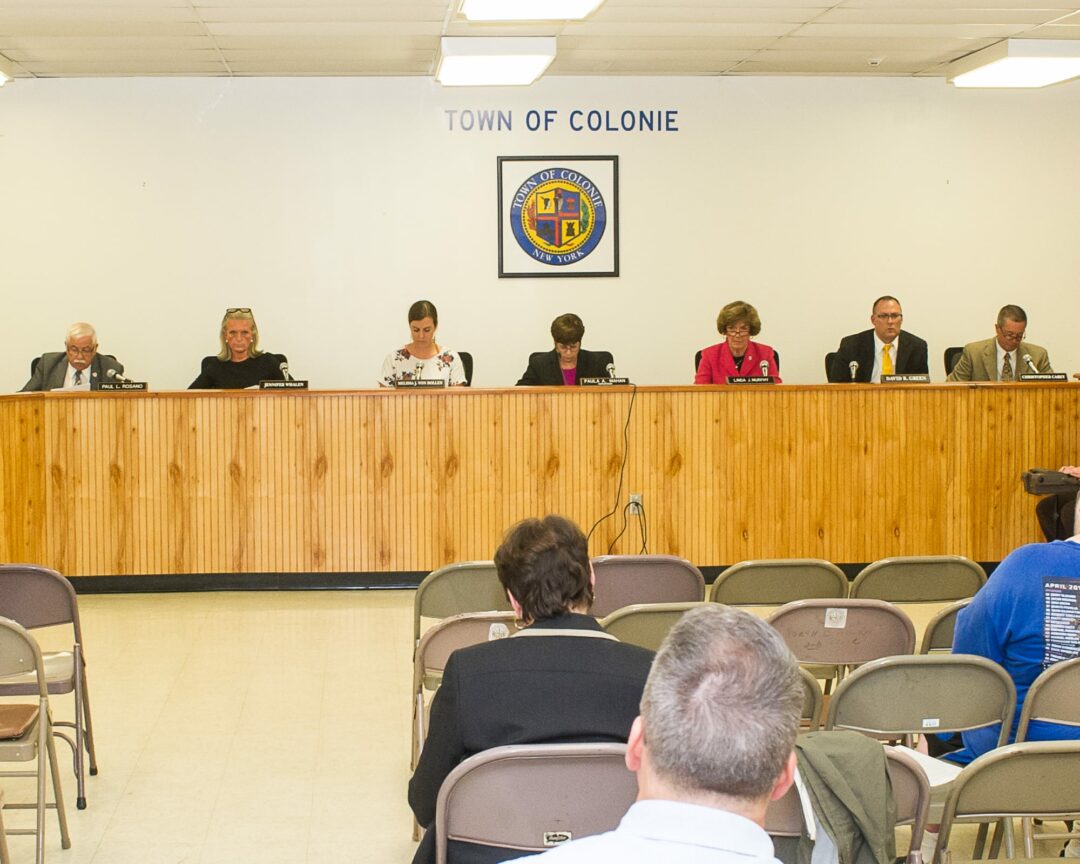#ColonieTownBoard #JimFranco #SpotlightNews
COLONIE — The Town Board and supervisor are voluntarily giving up their raises to help offset a 7.5 percent tax increase.
The raises given to the town’s some 500 employees is one main reason Supervisor Paula Mahan is proposing a tax increase that exceeds the state’s 2 percent tax cap, which based on the formula is 3.4 percent.
The negotiated raises, which equal about 1.25 percent over the four-year life of the union contracts, were passed onto employees not represented by a bargaining unit and that includes elected officials.
“We talked about it and everyone is on board and we all volunteered to give up the raises,” Mahan said. “It’s good everyone is doing it but it’s a minimal amount so I don’t know what the exact percentage of savings but it’s close but to .02 percent.”
Mahan’s salary would have increased from $123,006 to $126,081. The deputy supervisor’s salary, a position currently held by Town Board member Linda Murphy, would have $21,918 to $22,466. Each of the five the board members would have seen their salaries jump from $21,479 to $22,016.
Mahan said it is up to the other elected officials, like the judges, the receiver of taxes and the town clerk, to decide if they too want to give up their raises.
She also said the Town Board plans on talking with members of the other boards like planning and the Zoning Board of Appeals but those increases represent an even smaller percentage of the proposed $96.6 million spending plan than Town Board stipends. For example, in the proposed budget the six members of the Planning Board, who meet twice a month and do hours of work outside of the meetings, would see their salaries jump from $3,690 to $3,730.
“The Town Board has been going through the budget, and it’s not final until everything gets reviewed and everyone comes back with comments,” she said.
She said the proposed budget committee already cut $900,000 from the budgetary recommendations made by the department heads.
The proposed budget increases spending by 5.28 percent and a good chuck of that is due to salary increases negotiated with six of the town’s seven unions. The only outstanding contract is for employees in the union representing employees working in the EMS.
While most of the contracts were settled last year, the town used a one-shot, $1.75 million sale of the former community center on Central Avenue to cover the cost. While it did fill a deficit, one-shot sources of revenue are not commonly accepted methods of structurally balancing a budget.
In all, according to the proposed budget, salaries for town employees will increase from $38.8 million in 2018 to $40.1 million in 2019, a 4.4 percent increase. The cost of providing employee benefits will increase 5.4 percent from $23.5 million to $24.7 million.
Health care also increased by $900,000 in 2019 and debt service will increase by 17.4 percent, from 9.2 million to $10.0 million, the majority of which is for ongoing infrastructure improvements.
There were also some new hires including a School Resource Officer which will bring the department up to 115 officers, a hire in the Department of Public Works and a new planner.
If approved as is, the budget represents to the homeowner an increase of 29.8 cents per $1,000 of assessed value. The owner of a median value home in Colonie, about $225,000, would see a net tax increase of about $42.57 per year, or $3.55 per month.
While it does exceed the state tax levy cap, the rules have changed and it will not impact residents’ ability to collect the annual state rebate check. That is now contingent upon whether or not school districts stay below the cap.
Because it does exceed the tax cap, though, a super majority, or five of seven members, must approve.
The Town Board will hold a public hearing on a necessary local law to exceed the tax cap and a public hearing on the budget on Nov. 8.
“We have a few more weeks so we will keep going through the budget and if anyone has any ideas we ask they bring them forward and we will talk about it and we will see if it is something feasible,” Mahan said. “There are just not of places to cut when we have a budget this lean. I am not willing to compromise public safety, and people want infrastructure improvements and people want their roads paved and we don’t want to lay anyone off because they do help provide a quality of life people are accustomed to”



